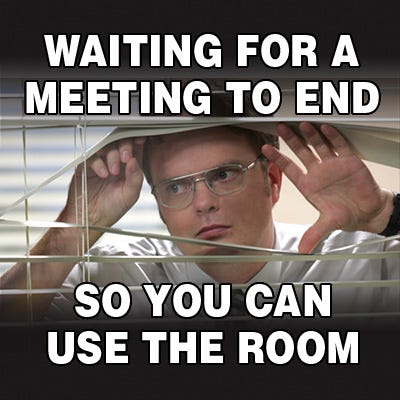Free shipping on all orders over $1,500 shipped within the continental U.S.
BTX Blog

People love The Office because it is so relatable. The events in the show may have been extreme examples, but it did a great job of capturing the day to day life of a person working in an office setting.
When it comes to booking meetings though, two characters, Michael Scott and Robert California, were the worst.
Michael’s funny personality and evident lack of professionalism made him an entertaining main character. Yes, he cared for his employees, but he also did not know where to draw the line between personal life and work life which led him to hold meetings for things that were not work-related.
Robert California, on the other hand, was unpredictable, had a cold attitude, didn’t care about having personal relationships with his employees. He had no problem taking over a conference room and using it as his office.
While these fictional characters made for entertaining managers, they also helped teach a couple of lessons when it comes to booking meetings.
1. Make Sure Your Meetings Have a Purpose
It might sound like an obvious fact, but how many times have you sat in a meeting and asked yourself “did we need a meeting for this?"
The Office was no different. Michael Scott tended to hold meetings that had almost no correlation to work being done in the office, including the multiple occasions he forced everyone to endure his personal “projects.”
One that sticks out the most is his movie “Threat Level Midnight.” Not only was the movie solely cast with people from within the office, but he also made everyone take time out of their workday to watch the film in its entirety in the offices only conference room.
Meetings are not always fun or exciting, but they should still have a purpose that is beneficial to everyone’s work. You don’t want to waste employee’s time during the work day, so it is essential to think about the material you plan on sharing at your meeting. It is also important to consider the time you are using in the conference room you have booked.
Someone else may want that room, so be sure you are using it the right way!
2. A Conference Room is not a Personal Office
A conference room is made to be used for meetings and presentations. It is not there to be used by the same person, all day, as an office. There were a lot of long, drawn-out meetings in The Office, but I think the worst use of their only conference room was by Robert California. Once he was introduced in the show, he took over the only meeting space in the whole office. Not only were employees scared to talk to him and worried about what side of the list they were on, but their only meeting space was completely booked.
The average meeting lasts between 30 to 60 minutes. If meetings are booked back to back, it is possible to get almost 9 or 10 meetings done in one room during a single workday.
If your meetings at your office usually are productive and you're trying to maximize your meeting space, you don't want one employee booking the room up and taking away that time from the rest of the office.
3. Impromptu Meetings Are Great, But Don’t Use them as a Distraction
Michael was always very spontaneous during the show, mainly when he was under pressure. The greatest, and my favorite, example of this was the day Pam went into labor. The moment Michael heard he called an impromptu meeting, shouting “That means conference room, five minutes! No, no, five seconds! Right now, right now!” Everyone rushed into the meeting to distract Pam. This went on for hours.
Michael was nervous and was trying to distract not only himself but other employees with a meeting as well.
Having the ability to book a meeting instantly when a room is available is a great feature and when used correctly can be extremely beneficial. If something important comes up while you're having a conversation, having the ability to go right to a conference room can save time and helps you continue your discussion without the need to go back to a desk and look for an available room.
However, when it’s used as only a way to distract people, you’ll end up wasting time.
Have a goal or topic in mind and be sure to think about whether the meeting has to happen at that very moment.
When booking a meeting, it is essential to think about the value of everyone’s time, yours included. Michael Scott and Robert California both seemed to forget about this. Even if you have the best intentions with the material you plan on discussing, you need to take a step back and evaluate your presentation, and the time you have allotted.

Comments
Leave A Reply
Your email address will not be published.